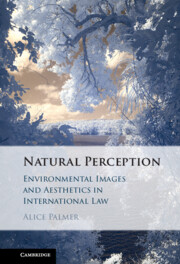Book contents
- Natural Perception
- Natural Perception
- Copyright page
- Dedication
- Contents
- Figures
- Acknowledgements
- 1 In the Frame
- 2 The Environment’s ‘Aesthetic’ Value
- 3 Legal Interpretation of Aesthetic Value
- 4 Images and Aesthetics for International Environmental Law
- 5 Valuing Aesthetics of World Natural Heritage
- 6 The Art of Image in the Whaling in the Antarctic Case
- 7 Fragmented Aesthetics of Biodiversity
- 8 Beyond the Frame: A Conclusion
- Bibliography
- Index
6 - The Art of Image in the Whaling in the Antarctic Case
Published online by Cambridge University Press: 02 August 2023
- Natural Perception
- Natural Perception
- Copyright page
- Dedication
- Contents
- Figures
- Acknowledgements
- 1 In the Frame
- 2 The Environment’s ‘Aesthetic’ Value
- 3 Legal Interpretation of Aesthetic Value
- 4 Images and Aesthetics for International Environmental Law
- 5 Valuing Aesthetics of World Natural Heritage
- 6 The Art of Image in the Whaling in the Antarctic Case
- 7 Fragmented Aesthetics of Biodiversity
- 8 Beyond the Frame: A Conclusion
- Bibliography
- Index
Summary
Chapter 6 progresses away from aesthetic judgements in the administration of an international environmental treaty to aesthetic representations made by states in the context of a treaty being enforced. Specifically, it analyses photographs submitted to the International Court of Justice in the Whaling in the Antarctic case by the disputing parties, Australia and Japan. That dispute concerned an exception to bans on whaling for scientific research under the Whaling Convention, one of three treaties examined in the book. The chapter identifies photographs of whales used by the parties before considering their potential role as evidence and as rhetoric. Acknowledging formal practices of the Court that treat images as evidence, it argues that aesthetic theory must be employed to understand the photographs as representations of aesthetic values in law rather than as records of fact. Visual art from Australia and Japan is then analysed to construct meanings of the aesthetic value of whales from the photographs in ways relevant to the parties’ claims. The chapter argues that the Court should recognise the images used in proceedings for their relevance to interpretation of the law.
Keywords
- Type
- Chapter
- Information
- Natural PerceptionEnvironmental Images and Aesthetics in International Law, pp. 159 - 196Publisher: Cambridge University PressPrint publication year: 2023



